|
|
|
Sort Order |
|
|
|
Items / Page
|
|
|
|
|
|
|
| Srl | Item |
| 1 |
ID:
128127
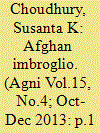

|
|
|
|
|
| Publication |
2013.
|
| Summary/Abstract |
The 11 September attacks in the United States caused NATO to invoke article 5 of the NATO charter for the first time in history. The article states that an attack on any member shall be considered to be attack on all. The invocation was confirmed on 4 October 2001 when NATO determined that the attacks were indeed eligible under the terms of North Atlantic Treaty Organisation, Eagle Assist and Operation Active Endeavour, a naval operation in the Mediterranean sea and is designed to prevent the movement of terrorists or weapons of mass destruction as well as to enhance the security of shipping the general which began on 4 October 2001.
|
|
|
|
|
|
|
|
|
|
|
|
|
|
|
|
| 2 |
ID:
124170
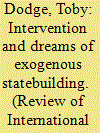

|
|
|
|
|
| Publication |
2013.
|
| Summary/Abstract |
The central thesis of this article is that when faced with state collapse, rising violence, and a complex stabilisation effort, the US, UN, and NATO in Afghanistan and the US and Britain in Iraq, deployed the dominant, if not only, international approach available, Liberal Peacebuilding. The article traces the rise of Liberal Peacebuilding across the 1990s. It argues that four units of analysis within neoliberal ideology, the individual, the market, the role of the state and democracy, played a key role within Liberal Peacebuilding, allowing it to identify problems and propose solutions to stabilise post-conflict societies. It was these four units of analysis that were taken from the Liberal Peacebuilding approach and applied in Afghanistan and Iraq. The application of a universal template to two very different countries led directly to the fierce but weak states that exist today.
|
|
|
|
|
|
|
|
|
|
|
|
|
|
|
|
| 3 |
ID:
130546
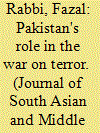

|
|
|
|
|
| Publication |
2014.
|
| Summary/Abstract |
The 9/11 terrorist attack on the United States has put the Muslim world in general and Pakistan in particular in crisis.' Immediately after the attacks, President G.W. Bush announced that ?ghting against terrorists would be his administration's top priority: "America and our friends and allies join with all those who want peace and security in the world, and we stand together to win the war against terrorism." He added that the United States would "make no distinction between the terrorists who committed these acts and those who harbor them." He put conditions before the nations of the world
to stand with the US in its anti-terrorist efforts or face US wrath. "Every nation, in every region, now has a decision to make. Either you are with us, or you are with the terrorists." He also declared that "This is a great opportunity" and "We have to think of this as an opportunity."'
|
|
|
|
|
|
|
|
|
|
|
|
|
|
|
|
| 4 |
ID:
114608
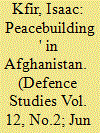

|
|
|
|
|
| Publication |
2012.
|
| Summary/Abstract |
Following the 9/11 attacks, the United States, with the approval of the international community and the support of a number of states, invaded Afghanistan. The mission had two aims. The first was to search out and capture or kill those members of Al-Qaeda responsible for the 9/11 attacks. A second objective was to rebuild Afghanistan in the hope that by removing the conditions that facilitated the rise of the Taliban, Afghanistan would cease to be a threat to international peace and security. The present paper, divided into three main sections, examines what the international community is striving to do in Afghanistan and explores whether 'peacebuilding', as understood by the international community, is achievable.
|
|
|
|
|
|
|
|
|
|
|
|
|
|
|
|
| 5 |
ID:
144032
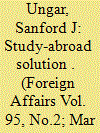

|
|
|
|
|
| Summary/Abstract |
In the Internet age, the world feels far smaller than it used to. But many Americans still know little about the rest of the world and may be more detached from it than ever. Such a lack of awareness is, in certain respects, understandable. Once the Cold War ended, some 25 years ago, Congress, perhaps out of a false sense of security, cut the foreign affairs budget, which led to the closing of some U.S. overseas posts. The news media, especially the commercial television networks, took their cue and began to reduce overseas coverage—responding, they said, to the decline of public interest in such matters, which conveniently coincided with their own economic woes. Although the 9/11 attacks and the subsequent wars in Afghanistan.
|
|
|
|
|
|
|
|
|
|
|
|
|
|
|
|
|
|
|
|
|